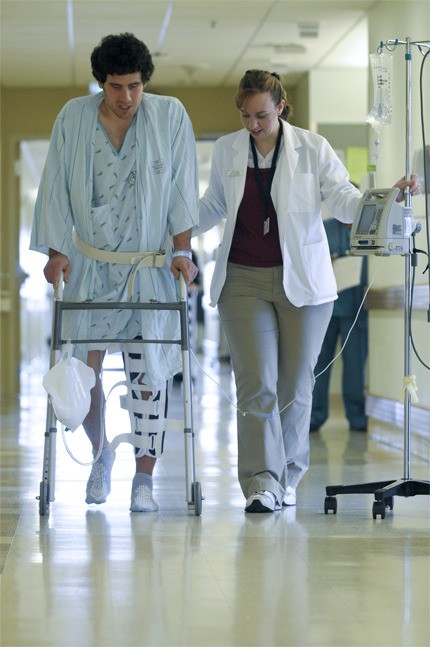It was pure luck that left a tiny tunnel of oxygen and light inside the huge mass of snow that buried hiker Ian Rogers atop Snoqualmie Pass.
Rogers, a 23-year-old Suffolk, England native, managed to call for help with his cell phone, then shout to summon rescuers, after the avalanche swamped him during a hike along Granite Mountain Lookout Trail on Saturday, April 10.
Rogers was descending the main avalanche chute of Granite Mountain Lookout Trail when the avalanche occurred, according to the King County Sheriff’s Office.
Rushing snow carried him around 100 feet, and left him buried with just a small tunnel of air connected to the surface.
“I don’t know how the hole was created,” he said. “Just sheer luck.”
Rogers covered his head as he tumbled, inadvertently creating space in front of his face and chest as the snow settled. It was just enough to try digging himself out.
“I was able to get my arms slowly toward the hole, but my left leg was absolutely jammed,” he said.
Rogers lost contact with dispatchers once his cell battery died. He waited nearly five hours before rescuers found him.
“I was really cold,” he said. “There were waves of shivering and being just absolutely freezing.”
King County Sheriff’s deputies had little information about Rogers’ location based on cell phone-tower relays, which indicated he was somewhere off Exit 47 along Interstate 90.
The state Department of Transportation notified deputies of an avalanche on the south slope of Granite Mountain, and Rogers was able to describe his approximate location along the trail to dispatchers.
Rescuers flew to the scene in a Guardian Two helicopter and heard calls for help.
A search dog finally discovered Rogers beneath around five feet of snow, and a military helicopter flew him to an ambulance. He was taken to Overlake Hospital in Bellevue, where doctors told him he had a possible sprained knee.
Rogers recovered from hypothermia at Overlake. By Tuesday, he had only a tweaked knee and a cold burn on his right hand to show for the avalanche. His spirits were high.
“It’s nice to know how powerful help from other people can be,” he said of his rescuers and the hospital staff. “It really picks you up and gives you high hopes.”
Rogers said he had trouble sleeping his first night after the avalanche.
“When I closed my eyes, I saw that wall of snow about to hit me or the hole I was in,” he said.
But the avalanche isn’t likely to stop Rogers from hiking again.
“I really don’t want this to stop me from climbing,” he said. “I want to get back out there and continue having fun. I think this will just make me a little more cautious and better prepared.”
King County Sheriff’s spokesman John Urquhart said Rogers didn’t necessarily break any hiking rules, but he offered this advice:
“If there’s a lot of new snow, stay out of the back country.”


